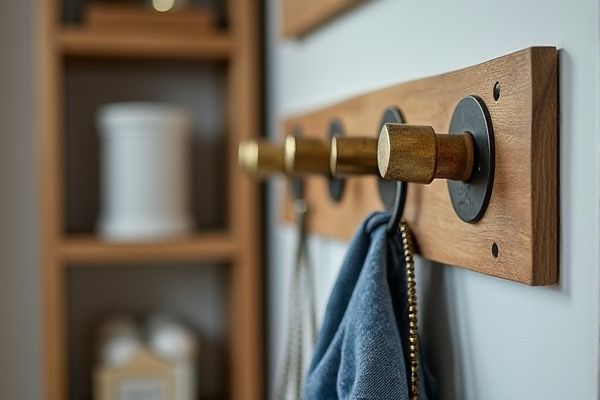
Steel hooks offer superior strength and durability, making them ideal for heavy-duty applications and long-term use, while brass hooks provide excellent corrosion resistance and an attractive, classic appearance suitable for decorative purposes. Discover how choosing between steel and brass hooks can impact the performance and aesthetics of your project by reading the rest of the article.
Table of Comparison
| Feature | Steel Hooks | Brass Hooks |
|---|---|---|
| Material | Carbon or stainless steel | Brass alloy (copper and zinc) |
| Strength | High tensile strength, durable | Moderate strength, less durable |
| Corrosion Resistance | Stainless steel: excellent Carbon steel: prone to rust |
Excellent natural resistance |
| Weight | Heavier | Lighter |
| Cost | Generally lower | Higher due to material value |
| Applications | Construction, heavy-duty uses, outdoor | Decorative, marine, light-duty uses |
| Aesthetics | Industrial look, silver-gray finish | Attractive gold-like finish |
Introduction to Steel and Brass Hooks
Steel hooks offer exceptional strength and durability, making them ideal for heavy-duty applications and long-term use, while brass hooks provide excellent corrosion resistance and a stylish, decorative finish suitable for lighter tasks. Your choice between steel and brass hooks depends on the specific requirements of strength, aesthetic appeal, and environmental conditions. Both materials serve distinct purposes, with steel excelling in robustness and brass standing out for its elegance and resistance to rust.
Material Composition and Properties
Steel hooks are primarily composed of iron alloyed with carbon, providing high tensile strength, durability, and resistance to deformation under heavy loads. Brass hooks consist mainly of copper and zinc, offering excellent corrosion resistance and a smooth, non-magnetic surface, but they typically have lower strength compared to steel. The inherent hardness and toughness of steel make it ideal for heavy-duty applications, while brass's corrosion-resistant and aesthetic qualities suit marine environments and decorative uses.
Strength and Durability Comparison
Steel hooks offer superior strength and durability compared to brass hooks, making them ideal for heavy-duty applications and long-term use. Brass hooks are more resistant to corrosion and provide a softer, more aesthetic finish but can bend or wear down under high stress. Your choice should balance the need for robust performance with environmental factors such as exposure to moisture or chemicals.
Corrosion Resistance: Steel vs Brass
Brass hooks offer superior corrosion resistance compared to standard steel hooks due to their natural alloy composition, which includes copper and zinc, making them highly resistant to rust and oxidation in marine and humid environments. Stainless steel hooks provide enhanced corrosion resistance over regular steel by incorporating chromium, which forms a protective oxide layer, but they may still corrode under extreme conditions or prolonged exposure to saltwater. Choosing between brass and stainless steel hooks depends on the specific environmental exposure and maintenance requirements, with brass being ideal for harsh, wet environments and stainless steel suitable for general outdoor use.
Weight and Load Capacity Analysis
Steel hooks generally offer higher load capacity and greater tensile strength compared to brass hooks, making them ideal for heavy-duty applications. Brass hooks are lighter in weight but have lower load-bearing capabilities, which suits them better for decorative or light-load uses. Choosing between steel and brass hooks depends on the specific requirements for strength, weight, and durability in your project.
Aesthetic Appeal and Finish Options
Steel hooks offer a sleek, modern aesthetic with a variety of finishes such as matte, polished, or brushed, providing versatility for contemporary designs. Brass hooks naturally possess a warm, golden hue that adds a classic, vintage charm, and their finishes can range from shiny lacquered to antiqued or satin. Choosing between steel and brass hooks depends on your desired visual impact and finish preferences to complement your interior or project style.
Cost Differences: Steel Hooks vs Brass Hooks
Steel hooks generally offer a more cost-effective option compared to brass hooks due to the lower price of raw materials and manufacturing processes. Brass hooks, composed mainly of copper and zinc, tend to be pricier because of the higher material costs and their corrosion-resistant properties. Choosing steel hooks is ideal for budget-conscious projects, while brass hooks provide durability and aesthetic appeal that justify their higher price point.
Common Applications and Uses
Steel hooks are widely used in heavy-duty applications such as construction, industrial rigging, and marine environments due to their high strength and durability. Brass hooks are preferred for decorative purposes, light-duty applications, and environments requiring corrosion resistance, such as in marine hardware and jewelry making. Understanding the differences helps you choose the appropriate hook based on load requirements and environmental conditions.
Maintenance and Longevity
Steel hooks offer superior durability and resistance to corrosion, requiring minimal maintenance to sustain their strength and appearance over time. Brass hooks, while visually appealing with natural tarnish resistance, demand regular polishing to maintain their shine and can wear down faster in harsh environments. Choosing steel hooks enhances your hardware longevity and reduces upkeep efforts, especially in outdoor or high-moisture settings.
Choosing the Right Hook for Your Needs
Steel hooks offer superior strength and corrosion resistance, making them ideal for heavy-duty or outdoor applications where durability is critical. Brass hooks provide excellent aesthetic appeal and natural resistance to tarnish, suitable for decorative or light-use purposes. Consider your specific requirements for load capacity and environment to choose the right hook that ensures safety and longevity.
 homyna.com
homyna.com